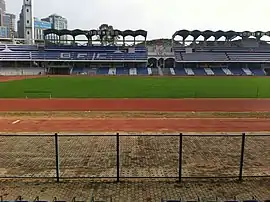Sampangi Outdoor Stadium | |
 | |
| Full name | Shree Kanteerava Outdoor Stadium |
|---|---|
| Former names | Sampangi Stadium |
| Location | Bangalore, India |
| Coordinates | 12°58′11″N 77°35′36″E / 12.9697°N 77.5934°E |
| Public transit | |
| Owner | Bengaluru Municipality |
| Capacity | 25,810[1] |
| Construction | |
| Built | 1946 |
| Opened | 31 May 1997 |
| General contractor | SVEC Constructions Ltd. |
| Tenants | |
| India national football team (2014–present) Bengaluru FC (2014–present) | |
Sree Kanteerava Outdoor Stadium, also known as Sampangi Outdoor Stadium, is a multi-purpose stadium in Bangalore, India. It houses a running track, a volleyball court, and two outdoor rock climbing walls. The stadium is owned by the Department of Youth Empowerment and Sports, Government of Karnataka.[2] It is the largest sporting complex in Bangalore.[3]
Renamed after Yuvaraja Kanteerava Narasimharaja Wadiyar, the stadium, constructed on the bed of the Sampangi Lake, was inaugurated in 1946 by his son Maharaja Jayachamaraja Wadiyar. Then housing a cinder track, a synthetic running track was laid in the 1990s leading up to the 1997 National Games of India for ₹220 million, and was completed by 31 May 1997.[4]
Stadium
The stadium was established in 1946 and was named Sampangi Stadium.[5] It was built on the bed of Sampangi Lake which was perceived as an environmental hazard and was drained in 1937 after it was neglected following supply of piped water from the Hesaraghatta Lake within Bangalore.[6] The stadium had a six-lane cinder track then, before the present synthetic track was laid. Sprinter Milkha Singh trained here in 1952.[5] The stadium hosted the touring Soviet Union national team in an exhibition game against the Mysore State XI in February 1955. The Soviets won 7–1.[7] Other sporting events held in the stadium include the final of the 1962 edition of the Santosh Trophy which the home Mysore team (now Karnataka team) won, and the 1996 edition of the National Games.[8]
Central arena

The central arena of the stadium consists of an eight-lane 400-metre synthetic athletic track, along with synthetic surfaced areas for field events like Shotput, Discuss, Javelin, Hammer throws, long jump, high jump, triple jump and pole vault. In addition to sporting events, the stadium also hosts walkathon, filmmaking, rallies and exhibition.[2]
The stadium contains four large arched entrances leading on to the inner field and lower spectator stands. The stadium has eight ramps taking spectators to the upper stands. Thus in total, 12 gates for spectators serve the stadium.[4]
See also
References
- ↑ "Sree Kanteerava Stadium". Indian Super League. Archived from the original on 13 March 2018. Retrieved 12 March 2018.
- 1 2 "Whose stadium is Bengaluru's Kanteerava, anyway?". The New Indian Express. 18 May 2017. Archived from the original on 14 November 2021. Retrieved 14 November 2021.
- ↑ "Condoms, syringes found in Kanteerava Stadium: Sports park in the day, illegal den of vice by night?". The News Minute. 18 November 2015. Archived from the original on 14 November 2021. Retrieved 14 November 2021.
- 1 2 "Massive capital injection for India stadium". Coliseum. 22 February 2021. Archived from the original on 14 November 2021. Retrieved 14 November 2021.
- 1 2 Sridhar, Shrivathsa (1 September 2014). "Flying Sikh sprints down memory track, recalls Bangalore visit". The Times of India. Archived from the original on 14 November 2021. Retrieved 14 November 2021.
- ↑ Shekhar, Divya (27 November 2017). "How the lakes died as Bengaluru modernised". The Economic Times. Archived from the original on 14 November 2021. Retrieved 14 November 2021.
- ↑ "Russians Score 7-1 Win Over Mysore In Exhibition Soccer". The Indian Express. 20 February 1955. p. 16.
- ↑ Samuel, Josey (8 December 2012). "Kanteerava going off track". Deccan Herald. Retrieved 14 November 2021.